Perspective in Criminology
VerifiedAdded on 2023/01/10
|7
|1436
|57
AI Summary
This essay discusses alcohol-related violence and one punch killings in Australia, and how public debate and political actions regarding these offences could be perceived as related to the neoliberal ideology.
Contribute Materials
Your contribution can guide someone’s learning journey. Share your
documents today.
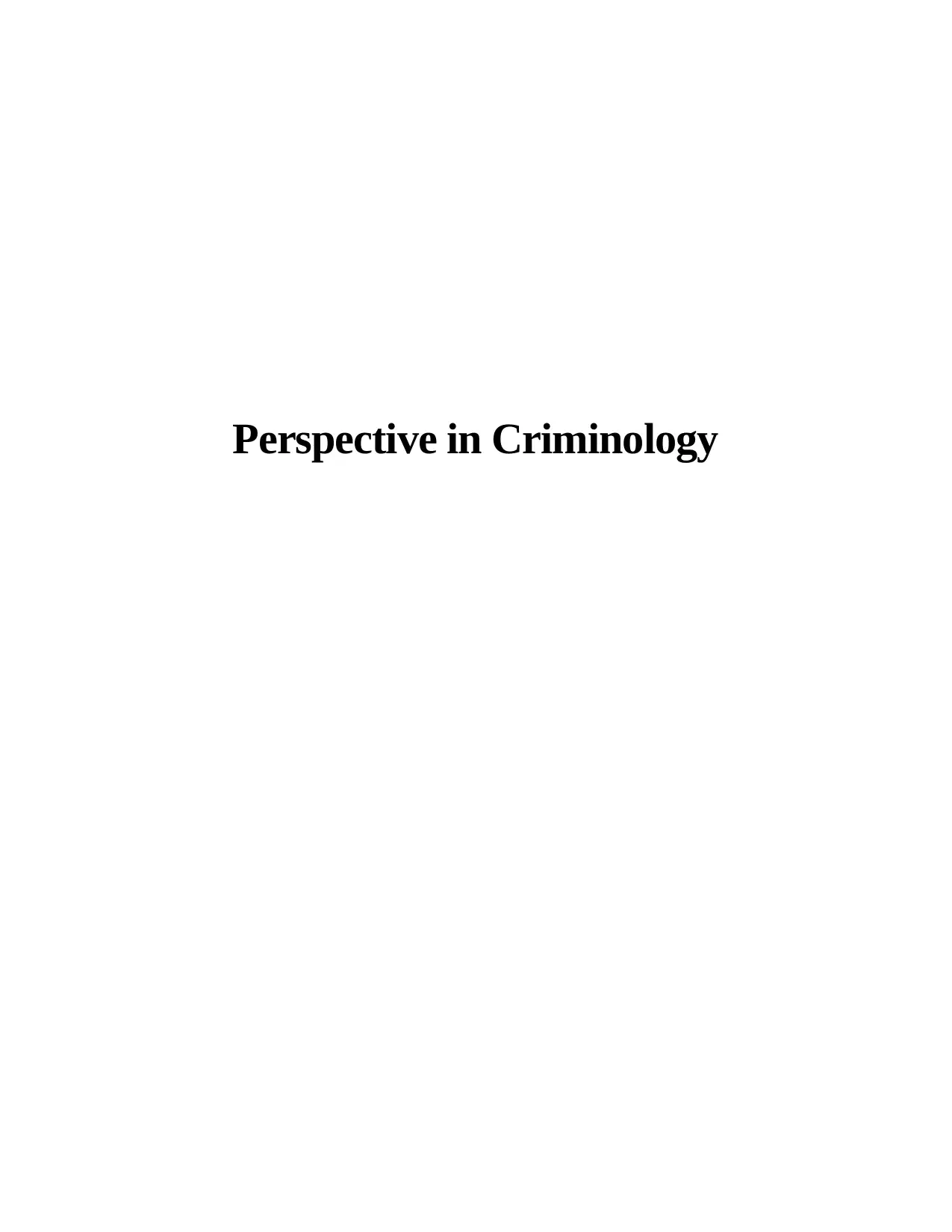
Perspective in Criminology
Secure Best Marks with AI Grader
Need help grading? Try our AI Grader for instant feedback on your assignments.
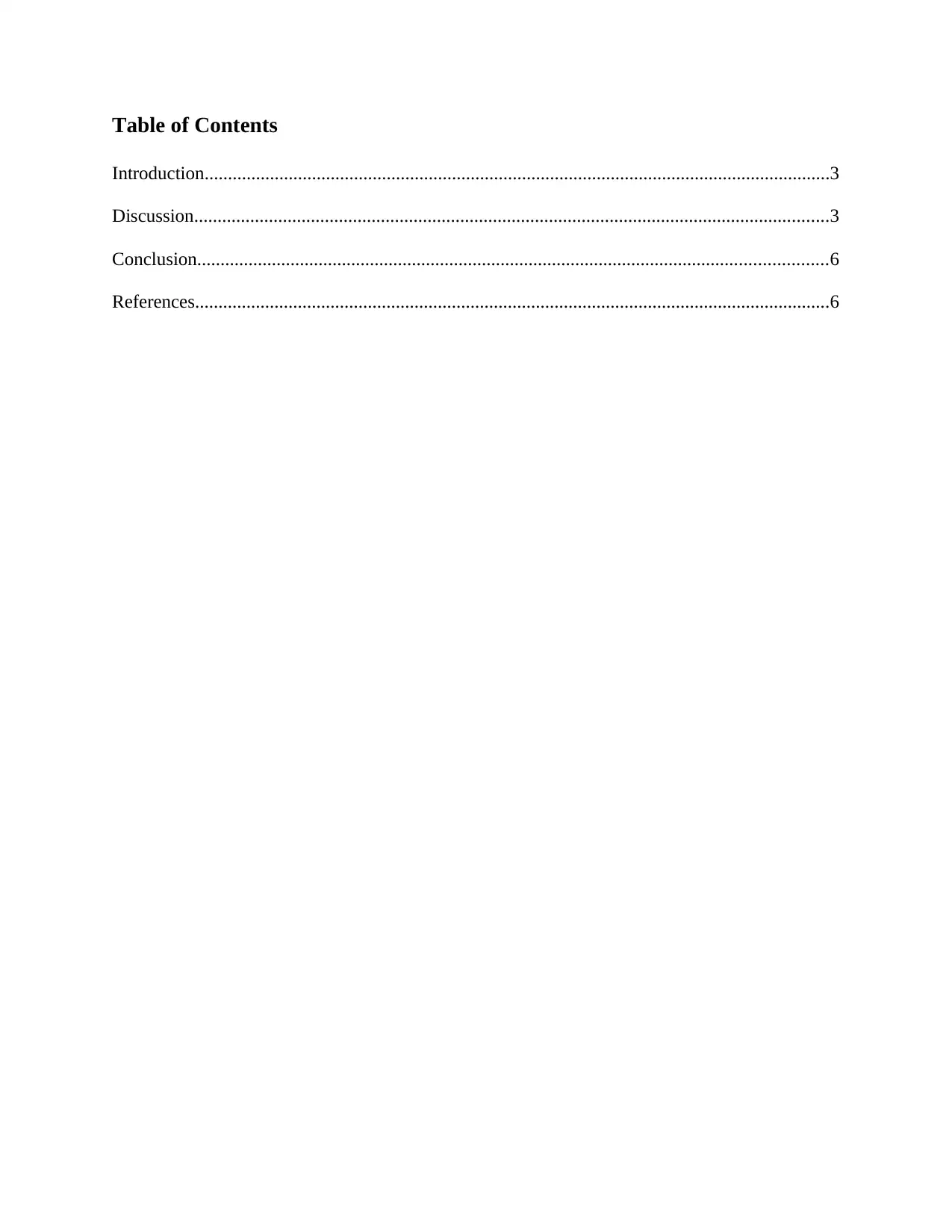
Table of Contents
Introduction......................................................................................................................................3
Discussion........................................................................................................................................3
Conclusion.......................................................................................................................................6
References........................................................................................................................................6
Introduction......................................................................................................................................3
Discussion........................................................................................................................................3
Conclusion.......................................................................................................................................6
References........................................................................................................................................6
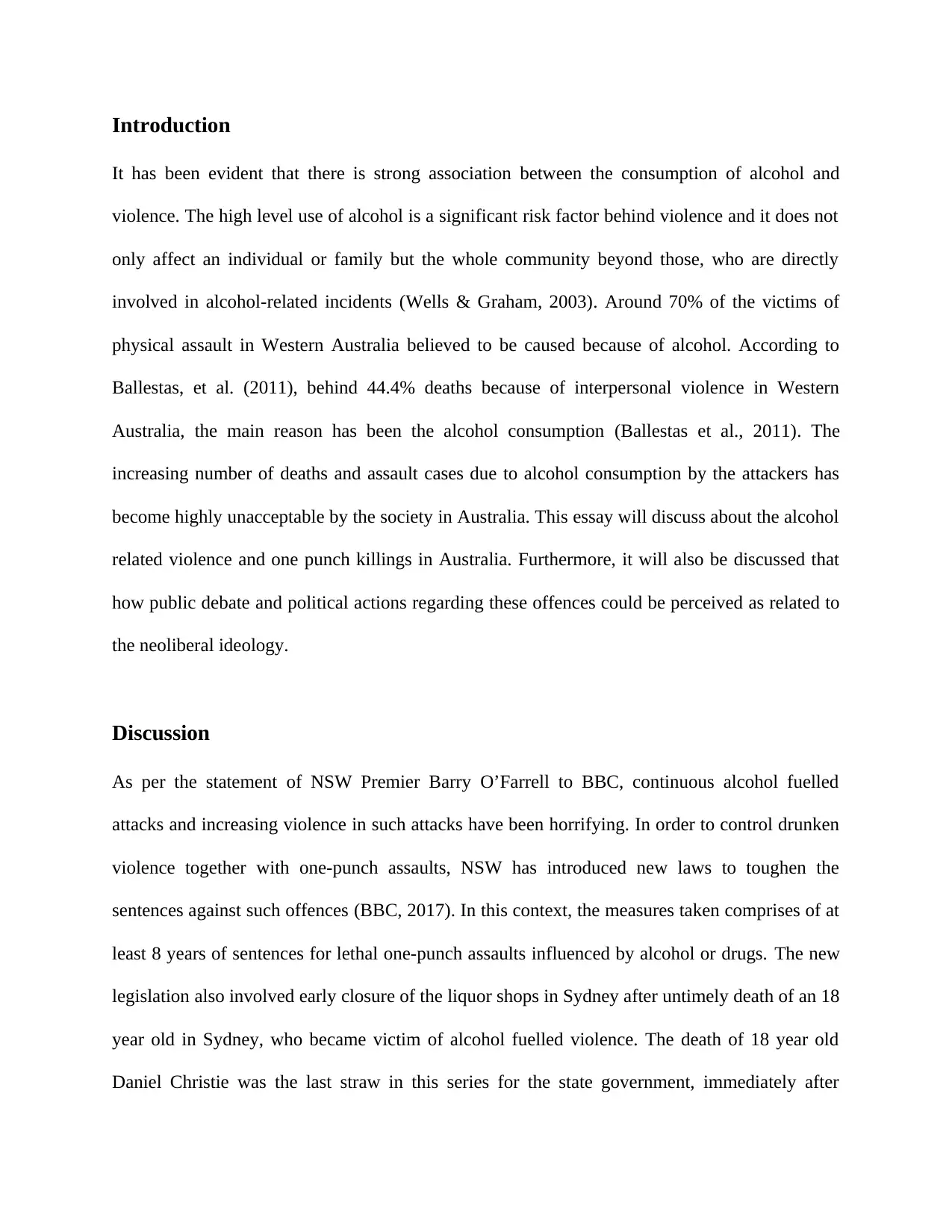
Introduction
It has been evident that there is strong association between the consumption of alcohol and
violence. The high level use of alcohol is a significant risk factor behind violence and it does not
only affect an individual or family but the whole community beyond those, who are directly
involved in alcohol-related incidents (Wells & Graham, 2003). Around 70% of the victims of
physical assault in Western Australia believed to be caused because of alcohol. According to
Ballestas, et al. (2011), behind 44.4% deaths because of interpersonal violence in Western
Australia, the main reason has been the alcohol consumption (Ballestas et al., 2011). The
increasing number of deaths and assault cases due to alcohol consumption by the attackers has
become highly unacceptable by the society in Australia. This essay will discuss about the alcohol
related violence and one punch killings in Australia. Furthermore, it will also be discussed that
how public debate and political actions regarding these offences could be perceived as related to
the neoliberal ideology.
Discussion
As per the statement of NSW Premier Barry O’Farrell to BBC, continuous alcohol fuelled
attacks and increasing violence in such attacks have been horrifying. In order to control drunken
violence together with one-punch assaults, NSW has introduced new laws to toughen the
sentences against such offences (BBC, 2017). In this context, the measures taken comprises of at
least 8 years of sentences for lethal one-punch assaults influenced by alcohol or drugs. The new
legislation also involved early closure of the liquor shops in Sydney after untimely death of an 18
year old in Sydney, who became victim of alcohol fuelled violence. The death of 18 year old
Daniel Christie was the last straw in this series for the state government, immediately after
It has been evident that there is strong association between the consumption of alcohol and
violence. The high level use of alcohol is a significant risk factor behind violence and it does not
only affect an individual or family but the whole community beyond those, who are directly
involved in alcohol-related incidents (Wells & Graham, 2003). Around 70% of the victims of
physical assault in Western Australia believed to be caused because of alcohol. According to
Ballestas, et al. (2011), behind 44.4% deaths because of interpersonal violence in Western
Australia, the main reason has been the alcohol consumption (Ballestas et al., 2011). The
increasing number of deaths and assault cases due to alcohol consumption by the attackers has
become highly unacceptable by the society in Australia. This essay will discuss about the alcohol
related violence and one punch killings in Australia. Furthermore, it will also be discussed that
how public debate and political actions regarding these offences could be perceived as related to
the neoliberal ideology.
Discussion
As per the statement of NSW Premier Barry O’Farrell to BBC, continuous alcohol fuelled
attacks and increasing violence in such attacks have been horrifying. In order to control drunken
violence together with one-punch assaults, NSW has introduced new laws to toughen the
sentences against such offences (BBC, 2017). In this context, the measures taken comprises of at
least 8 years of sentences for lethal one-punch assaults influenced by alcohol or drugs. The new
legislation also involved early closure of the liquor shops in Sydney after untimely death of an 18
year old in Sydney, who became victim of alcohol fuelled violence. The death of 18 year old
Daniel Christie was the last straw in this series for the state government, immediately after
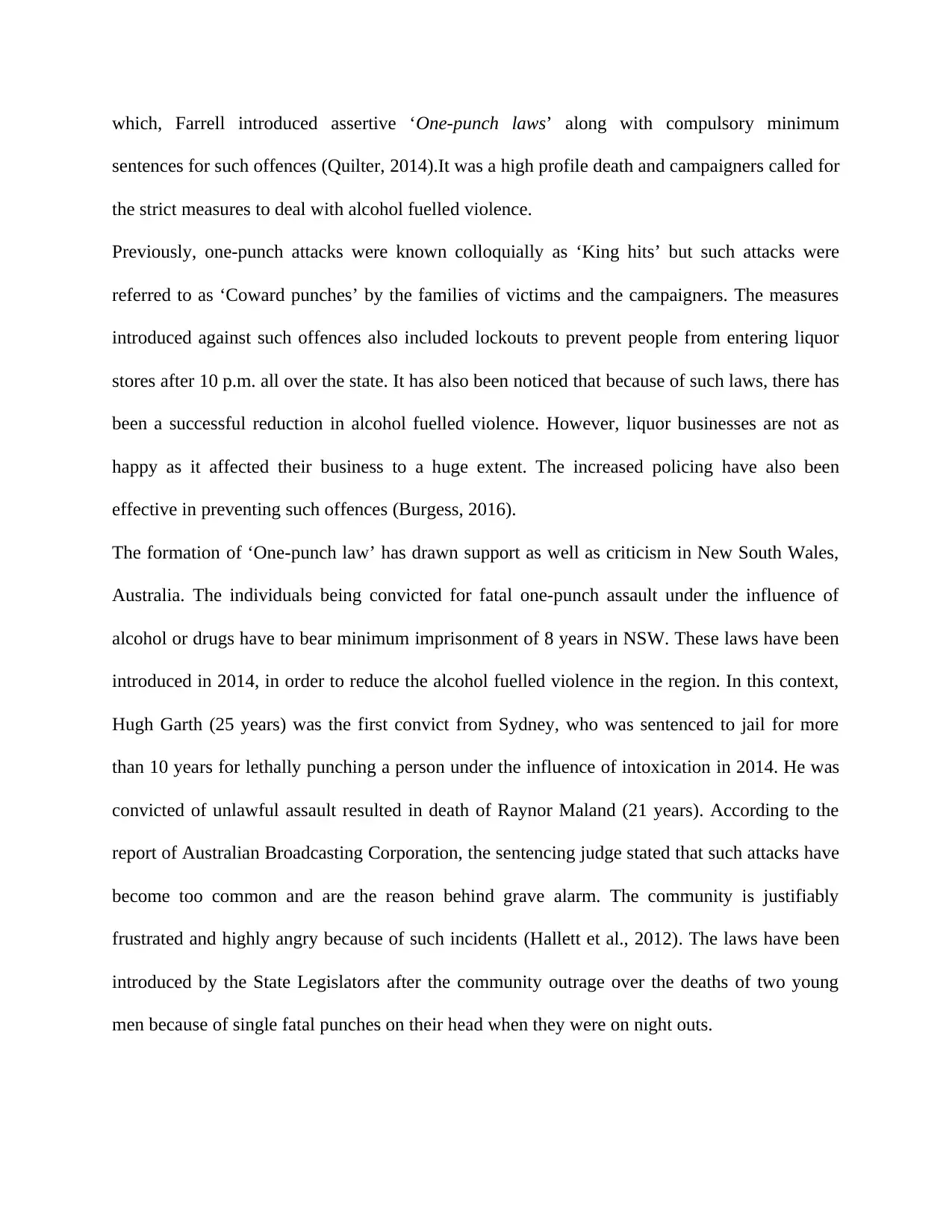
which, Farrell introduced assertive ‘One-punch laws’ along with compulsory minimum
sentences for such offences (Quilter, 2014).It was a high profile death and campaigners called for
the strict measures to deal with alcohol fuelled violence.
Previously, one-punch attacks were known colloquially as ‘King hits’ but such attacks were
referred to as ‘Coward punches’ by the families of victims and the campaigners. The measures
introduced against such offences also included lockouts to prevent people from entering liquor
stores after 10 p.m. all over the state. It has also been noticed that because of such laws, there has
been a successful reduction in alcohol fuelled violence. However, liquor businesses are not as
happy as it affected their business to a huge extent. The increased policing have also been
effective in preventing such offences (Burgess, 2016).
The formation of ‘One-punch law’ has drawn support as well as criticism in New South Wales,
Australia. The individuals being convicted for fatal one-punch assault under the influence of
alcohol or drugs have to bear minimum imprisonment of 8 years in NSW. These laws have been
introduced in 2014, in order to reduce the alcohol fuelled violence in the region. In this context,
Hugh Garth (25 years) was the first convict from Sydney, who was sentenced to jail for more
than 10 years for lethally punching a person under the influence of intoxication in 2014. He was
convicted of unlawful assault resulted in death of Raynor Maland (21 years). According to the
report of Australian Broadcasting Corporation, the sentencing judge stated that such attacks have
become too common and are the reason behind grave alarm. The community is justifiably
frustrated and highly angry because of such incidents (Hallett et al., 2012). The laws have been
introduced by the State Legislators after the community outrage over the deaths of two young
men because of single fatal punches on their head when they were on night outs.
sentences for such offences (Quilter, 2014).It was a high profile death and campaigners called for
the strict measures to deal with alcohol fuelled violence.
Previously, one-punch attacks were known colloquially as ‘King hits’ but such attacks were
referred to as ‘Coward punches’ by the families of victims and the campaigners. The measures
introduced against such offences also included lockouts to prevent people from entering liquor
stores after 10 p.m. all over the state. It has also been noticed that because of such laws, there has
been a successful reduction in alcohol fuelled violence. However, liquor businesses are not as
happy as it affected their business to a huge extent. The increased policing have also been
effective in preventing such offences (Burgess, 2016).
The formation of ‘One-punch law’ has drawn support as well as criticism in New South Wales,
Australia. The individuals being convicted for fatal one-punch assault under the influence of
alcohol or drugs have to bear minimum imprisonment of 8 years in NSW. These laws have been
introduced in 2014, in order to reduce the alcohol fuelled violence in the region. In this context,
Hugh Garth (25 years) was the first convict from Sydney, who was sentenced to jail for more
than 10 years for lethally punching a person under the influence of intoxication in 2014. He was
convicted of unlawful assault resulted in death of Raynor Maland (21 years). According to the
report of Australian Broadcasting Corporation, the sentencing judge stated that such attacks have
become too common and are the reason behind grave alarm. The community is justifiably
frustrated and highly angry because of such incidents (Hallett et al., 2012). The laws have been
introduced by the State Legislators after the community outrage over the deaths of two young
men because of single fatal punches on their head when they were on night outs.
Secure Best Marks with AI Grader
Need help grading? Try our AI Grader for instant feedback on your assignments.
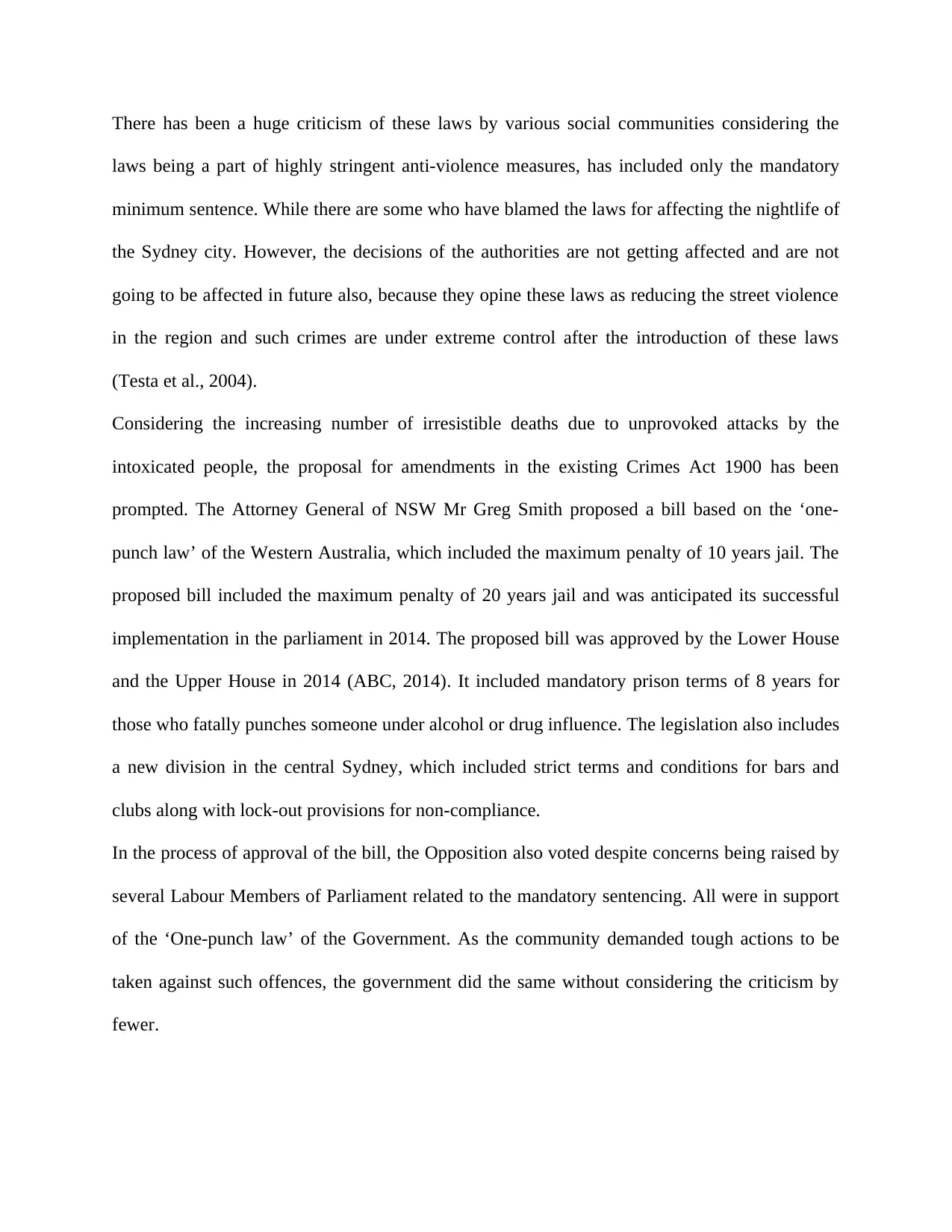
There has been a huge criticism of these laws by various social communities considering the
laws being a part of highly stringent anti-violence measures, has included only the mandatory
minimum sentence. While there are some who have blamed the laws for affecting the nightlife of
the Sydney city. However, the decisions of the authorities are not getting affected and are not
going to be affected in future also, because they opine these laws as reducing the street violence
in the region and such crimes are under extreme control after the introduction of these laws
(Testa et al., 2004).
Considering the increasing number of irresistible deaths due to unprovoked attacks by the
intoxicated people, the proposal for amendments in the existing Crimes Act 1900 has been
prompted. The Attorney General of NSW Mr Greg Smith proposed a bill based on the ‘one-
punch law’ of the Western Australia, which included the maximum penalty of 10 years jail. The
proposed bill included the maximum penalty of 20 years jail and was anticipated its successful
implementation in the parliament in 2014. The proposed bill was approved by the Lower House
and the Upper House in 2014 (ABC, 2014). It included mandatory prison terms of 8 years for
those who fatally punches someone under alcohol or drug influence. The legislation also includes
a new division in the central Sydney, which included strict terms and conditions for bars and
clubs along with lock-out provisions for non-compliance.
In the process of approval of the bill, the Opposition also voted despite concerns being raised by
several Labour Members of Parliament related to the mandatory sentencing. All were in support
of the ‘One-punch law’ of the Government. As the community demanded tough actions to be
taken against such offences, the government did the same without considering the criticism by
fewer.
laws being a part of highly stringent anti-violence measures, has included only the mandatory
minimum sentence. While there are some who have blamed the laws for affecting the nightlife of
the Sydney city. However, the decisions of the authorities are not getting affected and are not
going to be affected in future also, because they opine these laws as reducing the street violence
in the region and such crimes are under extreme control after the introduction of these laws
(Testa et al., 2004).
Considering the increasing number of irresistible deaths due to unprovoked attacks by the
intoxicated people, the proposal for amendments in the existing Crimes Act 1900 has been
prompted. The Attorney General of NSW Mr Greg Smith proposed a bill based on the ‘one-
punch law’ of the Western Australia, which included the maximum penalty of 10 years jail. The
proposed bill included the maximum penalty of 20 years jail and was anticipated its successful
implementation in the parliament in 2014. The proposed bill was approved by the Lower House
and the Upper House in 2014 (ABC, 2014). It included mandatory prison terms of 8 years for
those who fatally punches someone under alcohol or drug influence. The legislation also includes
a new division in the central Sydney, which included strict terms and conditions for bars and
clubs along with lock-out provisions for non-compliance.
In the process of approval of the bill, the Opposition also voted despite concerns being raised by
several Labour Members of Parliament related to the mandatory sentencing. All were in support
of the ‘One-punch law’ of the Government. As the community demanded tough actions to be
taken against such offences, the government did the same without considering the criticism by
fewer.
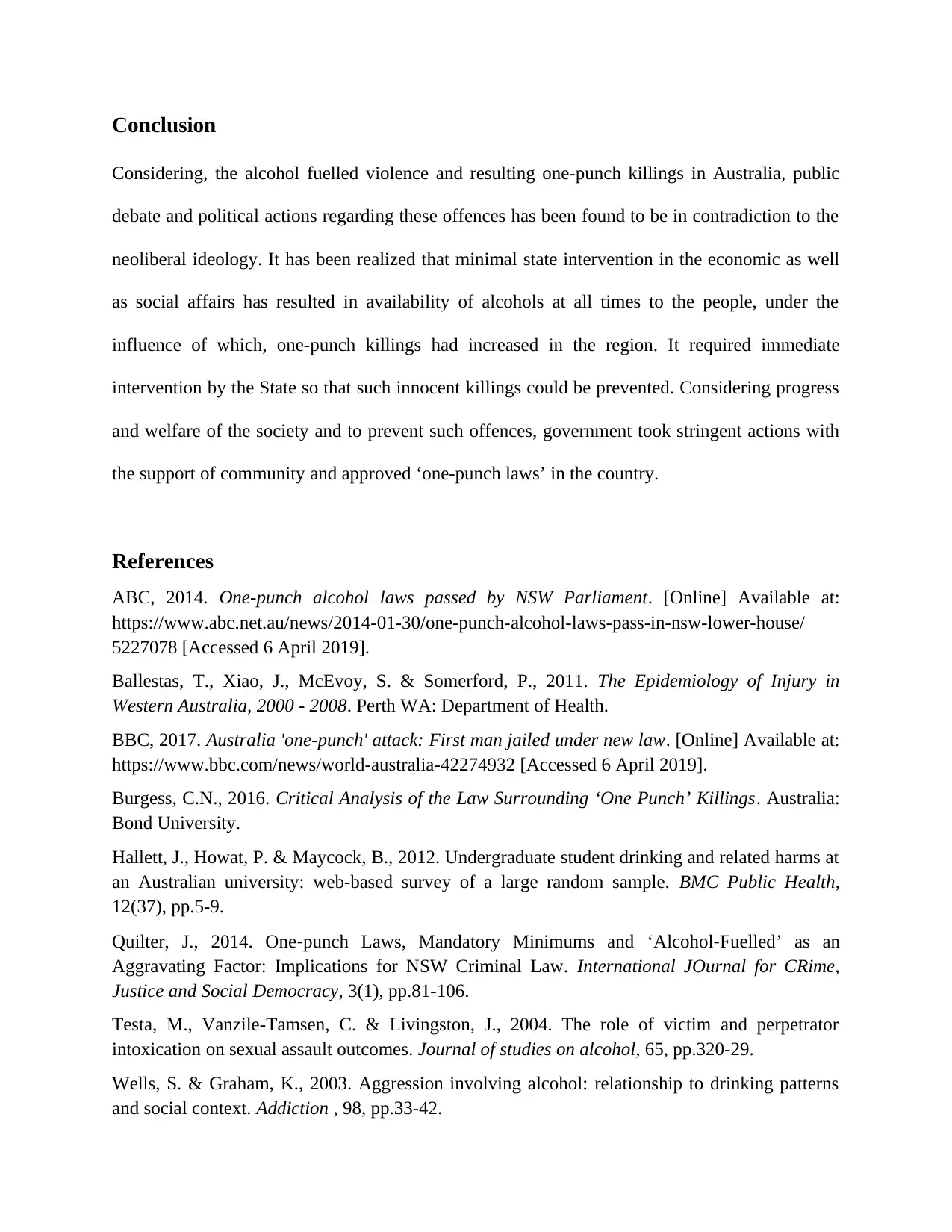
Conclusion
Considering, the alcohol fuelled violence and resulting one-punch killings in Australia, public
debate and political actions regarding these offences has been found to be in contradiction to the
neoliberal ideology. It has been realized that minimal state intervention in the economic as well
as social affairs has resulted in availability of alcohols at all times to the people, under the
influence of which, one-punch killings had increased in the region. It required immediate
intervention by the State so that such innocent killings could be prevented. Considering progress
and welfare of the society and to prevent such offences, government took stringent actions with
the support of community and approved ‘one-punch laws’ in the country.
References
ABC, 2014. One-punch alcohol laws passed by NSW Parliament. [Online] Available at:
https://www.abc.net.au/news/2014-01-30/one-punch-alcohol-laws-pass-in-nsw-lower-house/
5227078 [Accessed 6 April 2019].
Ballestas, T., Xiao, J., McEvoy, S. & Somerford, P., 2011. The Epidemiology of Injury in
Western Australia, 2000 - 2008. Perth WA: Department of Health.
BBC, 2017. Australia 'one-punch' attack: First man jailed under new law. [Online] Available at:
https://www.bbc.com/news/world-australia-42274932 [Accessed 6 April 2019].
Burgess, C.N., 2016. Critical Analysis of the Law Surrounding ‘One Punch’ Killings. Australia:
Bond University.
Hallett, J., Howat, P. & Maycock, B., 2012. Undergraduate student drinking and related harms at
an Australian university: web-based survey of a large random sample. BMC Public Health,
12(37), pp.5-9.
Quilter, J., 2014. One‐punch Laws, Mandatory Minimums and ‘Alcohol‐Fuelled’ as an
Aggravating Factor: Implications for NSW Criminal Law. International JOurnal for CRime,
Justice and Social Democracy, 3(1), pp.81-106.
Testa, M., Vanzile-Tamsen, C. & Livingston, J., 2004. The role of victim and perpetrator
intoxication on sexual assault outcomes. Journal of studies on alcohol, 65, pp.320-29.
Wells, S. & Graham, K., 2003. Aggression involving alcohol: relationship to drinking patterns
and social context. Addiction , 98, pp.33-42.
Considering, the alcohol fuelled violence and resulting one-punch killings in Australia, public
debate and political actions regarding these offences has been found to be in contradiction to the
neoliberal ideology. It has been realized that minimal state intervention in the economic as well
as social affairs has resulted in availability of alcohols at all times to the people, under the
influence of which, one-punch killings had increased in the region. It required immediate
intervention by the State so that such innocent killings could be prevented. Considering progress
and welfare of the society and to prevent such offences, government took stringent actions with
the support of community and approved ‘one-punch laws’ in the country.
References
ABC, 2014. One-punch alcohol laws passed by NSW Parliament. [Online] Available at:
https://www.abc.net.au/news/2014-01-30/one-punch-alcohol-laws-pass-in-nsw-lower-house/
5227078 [Accessed 6 April 2019].
Ballestas, T., Xiao, J., McEvoy, S. & Somerford, P., 2011. The Epidemiology of Injury in
Western Australia, 2000 - 2008. Perth WA: Department of Health.
BBC, 2017. Australia 'one-punch' attack: First man jailed under new law. [Online] Available at:
https://www.bbc.com/news/world-australia-42274932 [Accessed 6 April 2019].
Burgess, C.N., 2016. Critical Analysis of the Law Surrounding ‘One Punch’ Killings. Australia:
Bond University.
Hallett, J., Howat, P. & Maycock, B., 2012. Undergraduate student drinking and related harms at
an Australian university: web-based survey of a large random sample. BMC Public Health,
12(37), pp.5-9.
Quilter, J., 2014. One‐punch Laws, Mandatory Minimums and ‘Alcohol‐Fuelled’ as an
Aggravating Factor: Implications for NSW Criminal Law. International JOurnal for CRime,
Justice and Social Democracy, 3(1), pp.81-106.
Testa, M., Vanzile-Tamsen, C. & Livingston, J., 2004. The role of victim and perpetrator
intoxication on sexual assault outcomes. Journal of studies on alcohol, 65, pp.320-29.
Wells, S. & Graham, K., 2003. Aggression involving alcohol: relationship to drinking patterns
and social context. Addiction , 98, pp.33-42.

1 out of 7
Your All-in-One AI-Powered Toolkit for Academic Success.
+13062052269
info@desklib.com
Available 24*7 on WhatsApp / Email
![[object Object]](/_next/static/media/star-bottom.7253800d.svg)
Unlock your academic potential
© 2024 | Zucol Services PVT LTD | All rights reserved.


